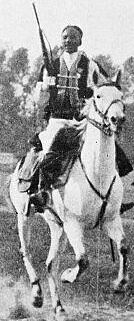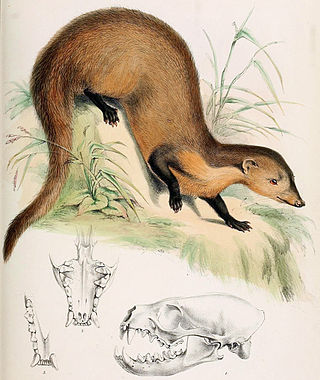
The Auxiliary Corps of the Black Shirts' Action Squads, most widely known as the Black Brigades, was one of the Fascist paramilitary groups, organized and run by the Republican Fascist Party operating in the Italian Social Republic, during the final years of World War II, and after the signing of the Italian Armistice in 1943. They were officially led by Alessandro Pavolini, former Minister of Culture of the fascist era during the last years of the Kingdom of Italy.

Savari was the designation given to the regular native Libyan cavalry regiments of the Italian colonial army from 1912 to 1943, in Italian Tripolitania and Italian Cyrenaica, and later in Italian Libya. The word "savari" was derived from a Persian term for "horsemen" (Savārān).

Zaptié was the designation given to locally raised gendarmerie units in the Italian colonies of Tripolitania, Cyrenaica, Eritrea and Somaliland between 1889 and 1943.

Dubat ; Arabic:العمائم البيضاء ); ḍubbāṭ: English: White turban) was the designation given to members of the semi-regular armed bands employed by the Italian "Royal Corps of Colonial Troops" in Italian Somaliland from 1924 to 1941. The word dubat was derived from a Somali phrase meaning "white turban".

Oedipina uniformis is a species of salamander in the family Plethodontidae. It is found in mountains and lowlands of central Costa Rica to the Panamian border and likely to occur in Panama.

Brigida's woodcreeper, also known as the Mato Grosso woodcreeper, is a subspecies of bird in the subfamily Dendrocolaptinae of the ovenbird family Furnariidae. It is endemic to Brazil.

The olive manakin is a species of bird in the family Pipridae.

The collared mongoose is a mongoose species native to Borneo and Sumatra; its presence in the Philippines is uncertain. It is listed as Near Threatened on the IUCN Red List.

Nocardicin A is a monocyclic β-lactam antibiotic included in the monobactam subclass. It is obtained from the fermentation broth of a strain of actinomycetes Nocardia uniformis subsp. tsuyamenensis as a metabolic product catalyzed by the enzyme nocardicin-A epimerase. It is stereochemically and biologically related to penicillin and cephalosporins.

Lasionycta uniformis is a moth of the family Noctuidae. It is widely distributed in the mountains of western North America. It occurs from southern Yukon to northern California and Colorado, with an isolated population in eastern Quebec.

Cypa uniformis is a species of moth of the family Sphingidae. It is known from China, north-western India and Borneo.

The Royal Corps of Colonial Troops was a corps of the Italian Royal Army, in which all the Italian colonial troops were grouped until the end of World War II in North Africa campaign.
Stempfferia uniformis, the Ikoyi epitola, is a butterfly in the family Lycaenidae. It is found in Nigeria and possibly Cameroon and the Democratic Republic of the Congo. The habitat consists of forests.

Pterolophia is a genus of longhorn beetles of the subfamily Lamiinae, containing the following species:

Sceloporus uniformis, also known as the yellow-backed spiny lizard, is a reptile of the family Phrynosomatidae. It is native to the Mojave and Great Basin deserts. Until recently, it was considered to be a subspecies of Sceloporus magister.

Grevillea uniformis is species of flowering plant in the family Proteaceae and is endemic to the south-west of Western Australia. It is a shrub with broadly egg-shaped to fan-shaped leaves with sharply tipped teeth or lobes, and more or less spherical clusters of white flowers.
Mansonia (Mansonioides) uniformis is a species of zoophilic mosquito belonging to the genus Mansonia.
The Military ranks of the Kingdom of Italy were the military insignia used by the Italian Armed Forces when Italy was the Kingdom of Italy (1861–1946). During the World Wars, the Carabinieri, as the then-most senior corps of the Army, wore similar insignia to those used by the rest of the service.
The Military ranks of the Italian Social Republic were the military insignia used by the National Republican Army of the Italian Social Republic. The ranks were essentially the same as the Military ranks of the Kingdom of Italy, however, with the symbols of the monarchy removed.













